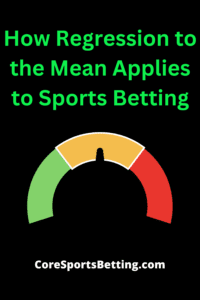If you're a sports handicapper looking for a structured and less risky way to manage your…
How Regression to the Mean Applies to Sports Betting

One of the most important – and misunderstood – principles in sports wagering is how regression to the mean applies to sports betting. Sure, this idea might sound simple, but it really matters if you want to bet smarter and make steady profits over time. Ignoring it can lead to overconfidence and reduced bankroll, while understanding it can help you identify value and make smart plays, especially when the public is overly influenced by recent trends.
Let’s dip our toes into the water and discuss what regression to the mean is, how it works in the sports world, and most importantly – how you can use it to your advantage as a bettor.
What Is Regression to the Mean?
In simple terms, regression to the mean is the idea that extreme performances – whether good or bad – are likely to return to a more typical or average level over time. It’s not mystical, and it doesn’t mean every team or player will become “average” overnight. It just means that outlier performances are usually followed by performances closer to the norm.
Everyday Examples
- A basketball player who shoots 8-for-10 from three-point range in one game is likely to shoot closer to their career average (say, 35%) in future games.
- A baseball hitter who starts the season batting .420 likely won’t finish the year at that level.
- A team that loses five games in a row may not be as bad as the streak suggests, just as a team that wins ten straight may not be as unbeatable as they seem.
In each of these cases, the extreme performance is followed by a “regression” back toward normal. This isn’t a fluke – it’s a reliable statistical tendency that plays out across every sport, season after season.
How It Applies to Sports and Betting
Understanding how regression to the mean applies to sports betting helps you avoid emotional overreactions – which is critical, because betting markets often reflect public sentiment. And public sentiment is often driven by what just happened, not what’s likely to happen next.
Overperforming and Underperforming Teams or Players
When a team or player is performing above or below their usual level, regression is likely around the corner. For instance:
- An NFL team with a +10-turnover differential through five games might be getting lucky with fumbles and interceptions – luck that won’t continue to last throughout the season.
- A soccer striker scoring on 40% of his shots likely won’t keep converting at that rate.
Betting Lines That Overreact
Sportsbooks often adjust lines based on public money. If bettors keep hammering a team that’s on a winning streak, the lines will reflect that. This opens up opportunities for handicappers who understand that these streaks are often unsustainable.
Real-World Betting Examples
Let’s break this down with some actual betting-related examples.
A Team Winning 10 Games in a Row
Imagine an MLB team goes on a 10-game win streak. The public perception skyrockets, and the media hypes them. As a result, sportsbooks shade the lines, pricing them as if they’re far superior to average.
But maybe they won six of those games by one run, or they benefited from errors and bullpen meltdowns. Bettors who expect the streak to continue blindly may be paying a premium – while sharp bettors anticipate a return to earth.
A Quarterback With an Unsustainable Completion Rate
Let’s say a college football QB completes 78% of his passes in September. The betting public may assume this level of play is the norm – next Heisman trophy winner. But what if his receivers are making circus catches, or he hasn’t faced a single top-50 defense?
When regression comes, and his completion rate drops to 62% against tougher competition, the lines may not adjust quickly enough – offering value to bettors who saw the regression coming.
Common Mistakes Bettors Make
Regression is a subtle concept, and many bettors fall into traps that cost them money.
Chasing “Hot” Teams
Everyone loves a hot team. But blindly betting on them without asking why they’re hot can be dangerous. Has the team truly improved, or have they just gotten lucky with schedule, weather, or injuries?
Assuming Recent Outcomes Will Continue Forever
Just because a team has covered five straight spreads doesn’t mean they will cover the sixth. The betting market adjusts. Past performance, especially short-term, is not a guarantee of future results.
How to Spot Regression Opportunities
Above average handicappers learn to spot when the public is buying the hype – and then consider going the other way.
Look for Inflated Lines or Public Overreaction
A telltale sign of public bias is when a line seems too high, especially after a dominant recent performance. If an NBA team has covered four straight by double digits, but their opponent now gets +14 in the next game despite solid underlying stats, that could be a regression spot.
Use Advanced Stats
Statistics like:
- Expected Goals (xG) in hockey and soccer.
- Pythagorean Wins in the NFL and MLB.
- BABIP (Batting Average on Balls In Play) in baseball.
- Effective Field Goal % in basketball.
Statistics like those mentioned above can inform you whether a team or player is over- or under-performing based on the quality of play rather than just the outcomes. Regression betting often comes down to identifying these gaps between results and reality.
Regression and Line Value
The holy grail of sports betting is finding value – situations where the implied probability (based on odds) is lower than the true probability. Regression plays a major role here.
Books Don’t Always Price in Regression
Especially early in a season, lines often reflect surface-level performance – not deeper metrics. In NFL Week 3, for example, the lines may be heavily swayed by a team’s first two games. If a team has two blowout wins, but their third-down conversion rate, yards per play, or turnover differential are unsustainable, you may get great value betting against them.
Tying Regression Into Your Strategy
When you find regression candidates, you don’t necessarily have to fade them every time. Instead, you can:
- Avoid overvalued teams in parlays.
- Use regression indicators in daily fantasy or prop bets.
- Compare public betting percentages with your own regression models to find market inefficiencies.
Combining Regression with Other Strategies
Regression is most powerful when paired with other smart betting tactics.
Regression + Public Betting Fades
The betting public tends to overreact. When regression is likely and the public is piling on, it creates some of the best value bets. For example, if 80% of bets are on a team that has been outperforming its expected stats, you’ve got a classic fade-the-public regression play.
Regression + Injury Analysis or Situational Trends
Let’s say a team has been dominating but loses its star quarterback. The betting public might still back them based on past performance, but you know regression is coming — not only due to the injury but because their previous numbers were boosted by unsustainable play. Now you’ve layered two edges into one bet.
Beware of Regression Impostors
Not every dip in performance is regression. And not every winning streak is luck.
Some teams genuinely improve – a young roster coming into form, or a team with a new offensive scheme finally clicking. Your job is to separate real change from random noise. Using tools like:
- Strength of schedule metrics
- Pace of play stats
- Weather adjustments
- Cluster injuries (multiple injuries in one position group)
Final Thoughts
Understanding how regression to the mean applies to sports betting can be fairly important if you want to go beyond casual wagering and develop a long-term profitable strategy. Markets tend to overreact. Streaks end. Stats normalize. And the handicappers who can see through the noise are the ones who win in the long run.
So the next time a team wins 10 straight, or a backup QB looks like a future Hall of Famer, pause. Ask yourself: Is this real? Or is regression coming?
Like this article? Pin it on Pinterest!





